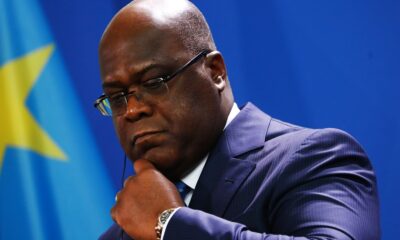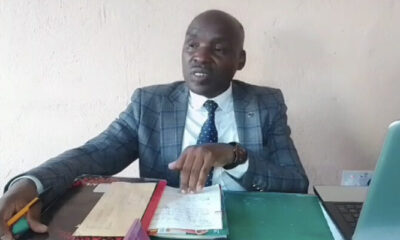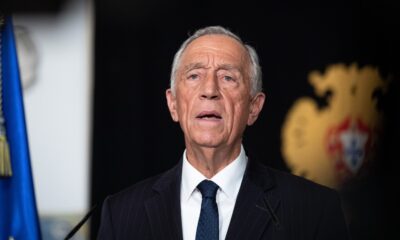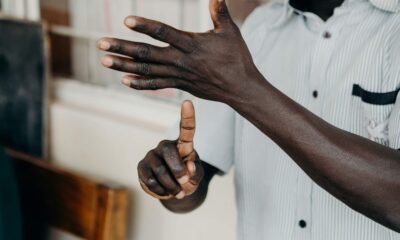Strictly Personal
The Igbo and death of a Queen by Lasisi Olagunju
Published
2 years agoon

On Tuesday, September 6, Liz Truss met Queen Elizabeth at Balmoral, Scotland. We saw her with the queen in a warm handshake as she became Britain’s historic third female head of government. The world clapped and congratulated her. Two days later, the Queen was dead. That is death. Sometimes it comes swiftly and stealthily; some other times with lightning and thunder. Whichever it is, it is the living who tells the taste, not the dead. Like the Belarusian novel of the Second World War, ‘The Dead Feel No Pain.’ Elizabeth II was a strong woman whose strength lay in floating with the sea of a changing world. She was a woman who had under her skirt, and in her bag, more than a lady’s content. Her ancestor, Elizabeth I, who reigned for 45 years and died on 24 March, 1603 at the age of 69, reportedly said of herself: “I may have the body of a weak and feeble woman but I have the heart and stomach, and the cock of a king.” It is the same with this departed queen. The world felt her soft masculinity for 70 years and, at her death, poured out in emotional millions. Those who experienced her ‘cock’ in Nigeria have been speaking too and it is with the distinct character of the Nigerian flavour.
Because we are not a normal people in Nigeria, our contribution to a global pool of discourse on the departed has been from a polluted tributary. The death of a celebrated 96-year-old citizen of the world drew daggers from one Uju Anya, a US assistant professor with an anger rooted in the 30-month Biafran war. In a tweet, she described the departed queen as “the chief monarch of a thieving, raping genocidal empire.” In another, she accused the queen’s government of contributing to the death of half of her family, ostensibly during the Nigerian civil war. She was bitter that Her Majesty’s government supported Nigeria against her attempted country from 1967 to January 1970. She, therefore, spat phlegm of fire on the casket of the departed queen and wished pains for the dead. English comedian and actor, Ricky Gervais, said “when you are dead, you do not know you are dead. It is only painful for others. The same applies when you are stupid.” The stupid is so called because they lack capability to know of their own lack of capacity. Uju got loads of replies; some came as barrel bombs against her person, her grouse and her house. I also felt that her choices, words and manners, were gross, very inappropriate. But she got huge endorsements from persons who called her their kin. She is a professor of Linguistics and she thinks cursing a dead ‘foe’ would heal her of a very bad history of war, defeat and the attendant losses! Sobbing and weeping have measures; when tears flood the eyes and blind the bereaved, they lose the patting of sympathy. The world noticed Anya’s statement and its inappropriateness and reacted. Founder of Amazon, Jeff Bezos, read her tweets and tweeted: “This is someone supposedly working to make the world better? I don’t think so. Wow.” I don’t think so too that she has not made poorer all who share the human space with her. Her verbal (and finger) incontinence will continue to rub off badly on her and the soul of her essence; the fabric of her grievance is rent too, whatever it was.
Our ancestors ask us to always remember that whatever faces us is turning its back on someone somewhere. When Uju attacked the late queen and called her an enemy of her people, it did not occur to her that an Igbo man was, at a time, secretary-general of the Commonwealth of Nations headed by that queen. I watched the old man, Emeka Anyaoku, on television and he had very many good, great things to say of the departed queen. Igbo people anywhere are very enterprising people. But my people have a saying about strong, enterprising people who talk too much about their supposed strength and who lack good strategy. They say such are the fathers of the weak. The world is a forever battlefield; you cannot win there by turning everyone into your enemy.
Probably, a consequence of Queen Elizabeth’s death is a reopening of the Nigerian wound. Nigeria fought a civil war which ended in January 1970. The Igbo who lost the war believe it has not ended. They think they deserve explanations and apologies from Nigeria for defeating them. They also believe other parts of Nigeria are still fighting them. But that is not true; if a war is on in Nigeria today, it is another war which the Igbo need to properly define and join others to defeat. If it is not true that the last war ended in 1970, why was it that just nine short years after the war, an Igbo man, Alex Ekwueme, became the vice president of Nigeria? The vice president of any country in a presidential democracy is one death away from the top job. Is it also not true that twelve years after the war, Emeka Ojukwu, the strong man who led the Igbo into that war, came back from exile and joined forces with the conservative north against other parts of the country? The Biafran leader was pardoned on May 18, 1982 by President Shehu Shagari. Exactly one month after, on June 18, Emeka Odumegwu Ojukwu landed in Nigeria at 11.55 a.m. Riding in an open-roof SUV from the airport, he was triumphant in his entry – an exact opposite of how he left the country in January 1970. A report of that journey said that before he boarded his Boeing 727 aircraft from Abidjan, Ivory Coast, where he was on exile for twelve years, Ojukwu shouted “Long live Nigeria.” The man came back home and built his hut in the compound of the ruling National Party of Nigeria (NPN). His people clapped and danced and endorsed his very ‘wise’ decision; he (and they) subsequently donated iron straws and reeds, poles and ropes to build an enduring structure for the enemy.
Nigeria is a country of victims. Wherever you turn, you see them, and that include all of us. Britain under Queen Elizabeth II took many decisions that, till date, victimised millions in Nigeria. One of those decisions is what the late Alaafin Lamidi Adeyemi described as this unfair, carnivorous union of lions and deers. But we can continue to fight and engage the system in a way that our right would not become wrong. Again, what we call victim is villain in the books of the other side. I wish those still angry about the civil war would accept that people died on both sides. There was a Colonel Victor Banjo, a Yoruba officer who was executed by his friend, Ojukwu. His offence was that he stalled a Biafran takeover of the West. His family and friends would not forget, but they’ve moved on. We cannot build a life of peace with the closed mind of recriminations. So, let Elizabeth take her bow in peace without further shelling. Besides, kingship comes with baggage – good and bad – each one drawing from the history of what they inherited. Elizabeth II became queen at 25 and died at 96; her ancestor, Elizabeth I, became queen at 25 and died at 69. Numerologists will have their things to say about these patterns of entry and closure and their values. Conjugal and marital scandals and controversies are never far from palaces. Elizabeth I, at the beginning of her reign, told the English parliament in 1559 that she would live, rule and die a virgin: “this shall be for me sufficient that a marble stone shall declare that a Queen, having reigned such a time, lived and died a virgin.” And she did. But why? History says she dreaded marriage or was appalled by what her father made of the institution of marriage. This is how a historian, Scott Newport, put it: “Elizabeth’s father, Henry VIII, married a total of six times, and as the famous mnemonic rhyme goes, they were divorced, beheaded, died, divorced, beheaded, survived. Of those beheaded of treason and adultery was her own mother, Anne Boleyn, on 19th May, 1536, when Elizabeth was not quite three years old. However, although Elizabeth was too young to understand the ‘speed and ruthfulness of Queen Anne’s downfall’ she was fully aware of her stepmother, Catherine Howard’s execution on 13th February, 1542, when she was eight years old. Once Catherine was arrested, her father ‘refused even to let her plead in her own defence.’ Of her four other stepmothers, two were divorced and cast aside; one died at childbirth and the other barely survived due to an implication of suspected heresy, months before her own father’s death. Therefore, Elizabeth’s views of matrimony with regard to her own father’s marriages can only have been connected to alienation or death, whether by childbirth or beheading.”
Beyond what the ‘Biafran’ woman said about the late queen, other Nigerians have also had quality time to discuss the departed sovereign and how she handled issues of matrimony in the palace. She had a wonderful married life; there were no (known) scandals involving her or her husband, Prince Phillip, Duke of Edinburgh. But with her household, the world has had a mouthful. Her son, the new king, married Diana Spencer after dating her sister, Sarah. He later divorced Diana in a very bitter way to marry his old flame, Camilla Parker Bowles, another man’s wife. When Diana, Princess of Wales, died in a Paris car crash on 31 August, 1997, the world dropped bouquets of anger at the Queen’s high grounds. Discussions on Diana and Elizabeth II, her son, her grandsons and their own issues will continue till history says enough. And history will never say so.
Now, everything, good or bad, when they get to Nigeria, they acquire federal character. And, you know, human experience is an elephant in a city of the blind. Each citizen reacts according to the part they feel. There are those who benefited from what aches Uju Anya and her Biafra ‘family’ and they are not quiet too. One Bashir El-Rufai, said to be the son of a northern governor, also went to Twitter to post a message of appreciation to the departed queen and her British empire. He thanked the departed for handing over Nigeria and everything in it to his north: “The British colonial establishment placed the north at the peak of power in my dear country. For that, I will always be indebted to the British Royal Crown and (for) the method of indirect rule for my people and our dear monarchs. Rest In Peace, Queen Elizabeth.” Like the Uju woman, Bashir also got replies, some from the north, supportive; many from the south, damning. There are those who replied him with photos of hopeless street children and of war and want – all taken in the north. They ask the governor’s son to what good the inheritance has benefited the inheritor of this slice of the British cake. You know how the wise looks at an ostrich who buries its head in the ground and thinks it has escaped from predators? The truth is that the ostrich, as it stands, is an easy prey. When flightless birds celebrate the origin of their problems, they mock their own intelligence, endanger themselves and imperil their species. What the British built for our north is a palace without peace; a throne of thorns. I hope Bashir and all who celebrate what he said know that the market is almost over.
You may like
-


Air Peace, capitalism and national interest, By Dakuku Peterside
-


This is chaos, not governance, and we must stop it, By Tee Ngugi
-


Off we go again with public shows, humbug and clowning, By Jenerali Uliwengu
-


How patriarchy underpins gender violence today, By Tee Ngugi
-


Help! There’s a dangerous, secret plot to save the EAC from imminent death, By Charles Onyango-Obbo
-


How South Africa, US elections could shape Tshisekedi’s bread in Kinshasa, By Charles Onyango-Obbo
Strictly Personal
Air Peace, capitalism and national interest, By Dakuku Peterside
Published
1 week agoon
April 16, 2024
Nigerian corporate influence and that of the West continue to collide. The rationale is straightforward: whereas corporate activity in Europe and America is part of their larger local and foreign policy engagement, privately owned enterprises in Nigeria or commercial interests are not part of Nigeria’s foreign policy ecosystem, neither is there a strong culture of government support for privately owned enterprises’ expansion locally and internationally.
The relationship between Nigerian businesses and foreign policy is important to the national interest. When backing domestic Nigerian companies to compete on a worldwide scale, the government should see it as a lever to drive foreign policy, and national strategic interest, promote trade, enhance national security considerations, and minimize distortion in the domestic market as the foreign airlines were doing, boost GDP, create employment opportunities, and optimize corporate returns for the firms.
Admitted nations do not always interfere directly in their companies’ business and commercial dealings, and there are always exceptions. I can cite two areas of exception: military sales by companies because of their strategic implications and are, therefore, part of foreign and diplomatic policy and processes. The second is where the products or routes of a company have implications for foreign policy. Air Peace falls into the second category in the Lagos – London route.
Two events demonstrate an emerging trend that, if not checked, will disincentivize Nigerian firms from competing in the global marketplace. There are other notable examples, but I am using these two examples because they are very recent and ongoing, and they are typological representations of the need for Nigerian government backing and support for local companies that are playing in a very competitive international market dominated by big foreign companies whose governments are using all forms of foreign policies and diplomacy to support and sustain.
The first is Air Peace. It is the only Nigerian-owned aviation company playing globally and checkmating the dominance of foreign airlines. The most recent advance is the commencement of flights on the Lagos – London route. In Nigeria, foreign airlines are well-established and accustomed to a lack of rivalry, yet a free-market economy depends on the existence of competition. Nigeria has significantly larger airline profits per passenger than other comparable African nations. Insufficient competition has resulted in high ticket costs and poor service quality. It is precisely this jinx that Air Peace is attempting to break.
On March 30, 2024, Air Peace reciprocated the lopsided Bilateral Air Service Agreement, BASA, between Nigeria and the United Kingdom when the local airline began direct flight operations from Lagos to Gatwick Airport in London. This elicited several reactions from foreign airlines backed by their various sovereigns because of their strategic interest. A critical response is the commencement of a price war. Before the Air Peace entry, the price of international flight tickets on the Lagos-London route had soared to as much as N3.5 million for the economy ticket. However, after Air Peace introduced a return economy class ticket priced at N1.2 million, foreign carriers like British Airways, Virgin Atlantic, and Qatar Airways reduced their fares significantly to remain competitive.
In a price war, there is little the government can do. In an open-market competitive situation such as this, our government must not act in a manner that suggests it is antagonistic to foreign players and competitors. There must be an appearance of a level playing field. However, government owes Air Peace protection against foreign competitors backed by their home governments. This is in the overall interest of the Nigerian consumer of goods and services. Competition history in the airspace works where the Consumer Protection Authority in the host country is active. This is almost absent in Nigeria and it is a reason why foreign airlines have been arbitrary in pricing their tickets. Nigerian consumers are often at the mercy of these foreign firms who lack any vista of patriotism and are more inclined to protect the national interest of their governments and countries.
It would not be too much to expect Nigerian companies playing globally to benefit from the protection of the Nigerian government to limit influence peddling by foreign-owned companies. The success of Air Peace should enable a more competitive and sustainable market, allowing domestic players to grow their network and propel Nigeria to the forefront of international aviation.
The second is Proforce, a Nigerian-owned military hardware manufacturing firm active in Rwanda, Chad, Mali, Ghana, Niger, Burkina Faso, and South Sudan. Despite the growing capacity of Proforce in military hardware manufacturing, Nigeria entered two lopsided arrangements with two UAE firms to supply military equipment worth billions of dollars , respectively. Both deals are backed by the UAE government but executed by UAE firms.
These deals on a more extensive web are not unconnected with UAE’s national strategic interest. In pursuit of its strategic national interest, India is pushing Indian firms to supply military equipment to Nigeria. The Nigerian defence equipment market has seen weaker indigenous competitors driven out due to the combination of local manufacturers’ lack of competitive capacity and government patronage of Asian, European, and US firms in the defence equipment manufacturing sector. This is a misnomer and needs to be corrected.
Not only should our government be the primary customer of this firm if its products meet international standards, but it should also support and protect it from the harsh competitive realities of a challenging but strategic market directly linked to our national military procurement ecosystem. The ability to produce military hardware locally is significant to our defence strategy.
This firm and similar companies playing in this strategic defence area must be considered strategic and have a considerable place in Nigeria’s foreign policy calculations. Protecting Nigeria’s interests is the primary reason for our engagement in global diplomacy. The government must deliberately balance national interest with capacity and competence in military hardware purchases. It will not be too much to ask these foreign firms to partner with local companies so we can embed the technology transfer advantages.
Our government must create an environment that enables our local companies to compete globally and ply their trades in various countries. It should be part of the government’s overall economic, strategic growth agenda to identify areas or sectors in which Nigerian companies have a competitive advantage, especially in the sub-region and across Africa and support the companies in these sectors to advance and grow to dominate in the African region with a view to competing globally. Government support in the form of incentives such as competitive grants ,tax credit for consumers ,low-interest capital, patronage, G2G business, operational support, and diplomatic lobbying, amongst others, will alter the competitive landscape. Governments and key government agencies in the west retain the services of lobbying firms in pursuit of its strategic interest.
Nigerian firms’ competitiveness on a global scale can only be enhanced by the support of the Nigerian government. Foreign policy interests should be a key driver of Nigerian trade agreements. How does the Nigerian government support private companies to grow and compete globally? Is it intentionally mapping out growth areas and creating opportunities for Nigerian firms to maximize their potential? Is the government at the domestic level removing bottlenecks and impediments to private company growth, allowing a level playing field for these companies to compete with international companies?
Why is the government patronising foreign firms against local firms if their products are of similar value? Why are Nigerian consumers left to the hands of international companies in some sectors without the government actively supporting the growth of local firms to compete in those sectors? These questions merit honest answers. Nigerian national interest must be the driving factor for our foreign policies, which must cover the private sector, just as is the case with most developed countries. The new global capitalism is not a product of accident or chance; the government has choreographed and shaped it by using foreign policies to support and protect local firms competing globally. Nigeria must learn to do the same to build a strong economy with more jobs.
Strictly Personal
This is chaos, not governance, and we must stop it, By Tee Ngugi
Published
2 weeks agoon
April 10, 2024
The following are stories that have dominated mainstream media in recent times. Fake fertiliser and attempts by powerful politicians to kill the story. A nation of bribes, government ministries and corporations where the vice is so routine that it has the semblance of policy. Irregular spending of billions in Nairobi County.
Billions are spent in all countries on domestic and foreign travel. Grabbing of land belonging to state corporations, was a scam reminiscent of the Kanu era when even public toilets would be grabbed. Crisis in the health and education sectors.
Tribalism in hiring for state jobs. Return of construction in riparian lands and natural waterways. Relocation of major businesses because of high cost of power and heavy taxation. A tax regime that is so punitive, it squeezes life out of small businesses. Etc, ad nauseam.
To be fair, these stories of thievery, mismanagement, negligence, incompetence and greed have been present in all administrations since independence.
However, instead of the cynically-named “mama mboga” government reversing this gradual slide towards state failure, it is fuelling it.
Alternately, it’s campaigning for 2027 or gallivanting all over the world, evoking the legend of Emperor Nero playing the violin as Rome burned.
A government is run based on strict adherence to policies and laws. It appoints the most competent personnel, irrespective of tribe, to run efficient departments which have clear-cut goals.
It aligns education to its national vision. Its strategies to achieve food security should be driven by the best brains and guided by innovative policies. It enacts policies that attract investment and incentivize building of businesses. It treats any kind of thievery or negligence as sabotage.
Government is not a political party. Government officials should have nothing to do with political party matters. They should be so engaged in their government duties that they literally would not have time for party issues. Government jobs should not be used to reward girlfriends and cronies.
Government is exhausting work undertaken because of a passion to transform lives, not for the trappings of power. Government is not endless campaigning to win the next election. To his credit, Mwai Kibaki left party matters alone until he had to run for re-election.
We have corrupted the meaning of government. We have parliamentarians beholden to their tribes, not to ideas.
We have incompetent and corrupt judges. We have a civil service where you bribe to be served. Police take bribes to allow death traps on our roads. We have urban planners who plan nothing except how to line their pockets. We have regulatory agencies that regulate nothing, including the intake of their fat stomachs.
We have advisers who advise on which tenders should go to whom. There is no central organising ethos at the heart of government. There is no sense of national purpose. We have flurries of national activities, policies, legislation, appointments which don’t lead to meaningful growth. We just run on the same spot.
Tee Ngugi is a Nairobi-based political commentator
EDITOR’S PICK


Media polarisation blamed for biased coverage, civil society leader calls for mindset shift
Chama Mwansa, Executive Director of the Chandarika Women and Youths Foundation, has attributed media biases to the similarities in coverage...


Nigeria: 118 prison inmates escape after rainstorm destroys facility
At least 118 inmates of the Medium Security Custodial Centre in Suleja, Niger State, in northern Nigeria, have reportedly escaped...


Tanzania’s auto-tech startup Spana is simplifying car maintenance— CEO
Tanzania’s auto-tech startup, Spana, has developed a mobile application for a bouquet of automobile services, enabling individual car owners and...


Nollywood thrown into mourning as another veteran actor Zulu Adigwe passes on
The Nigerian movie industry, popularly known as Nollywood, has once again been thrown into mourning with the death of veteran...


Zambian FA boss, Gen.Sec arrested over alleged laundering of K341,902
President of the Football Association of Zambia (FAZ), Andrew Kamanga, has been arrested along with the Secretary-General and two other...


Luapula businessman, Munsanje, reflects on media freedoms and freedom of expression
As stakeholder engagement intensifies regarding the ongoing project to amplify voices on media freedom, freedom of expression, and digital rights,...


World Bank stops tourism fund to Tanzania’s Ruaha park. Here’s why
A spokesperson for the World Bank said on Wednesday that the lender had stopped all new payments from a $150...


‘It would be risky to release Binance executive from custody risky’, Nigerian govt says
Nigeria’s anti-corruption agency, the Economic and Financial Crimes Commission (EFCC), believes admitting the detained executive of cryptocurrency firm, Binance Holdings...


President de Sousa insists Portugal must ‘pay costs’ of slavery, colonial crimes
Following recent conversations around reparations to countries with colonial heritage, Portuguese President, Marcelo Rebelo de Sousa, has added his voice...


Nigeria’s antigraft agency EFCC may try 300 forex racketeers
The Economic and Financial Crimes Commission (EFCC), Nigeria’s anti-corruption body, could go after 300 forex criminals who trade on a...
Trending
-

 Musings From Abroad1 day ago
Musings From Abroad1 day agoPresident de Sousa insists Portugal must ‘pay costs’ of slavery, colonial crimes
-

 Culture2 days ago
Culture2 days agoEgypt reclaims 3,400-year-old stolen statue of King Ramses II
-

 Tech21 hours ago
Tech21 hours agoTanzania’s auto-tech startup Spana is simplifying car maintenance— CEO
-

 Metro2 days ago
Metro2 days agoSign language interpreter, Kunda, seeks inclusivity in media rights agenda (video)


